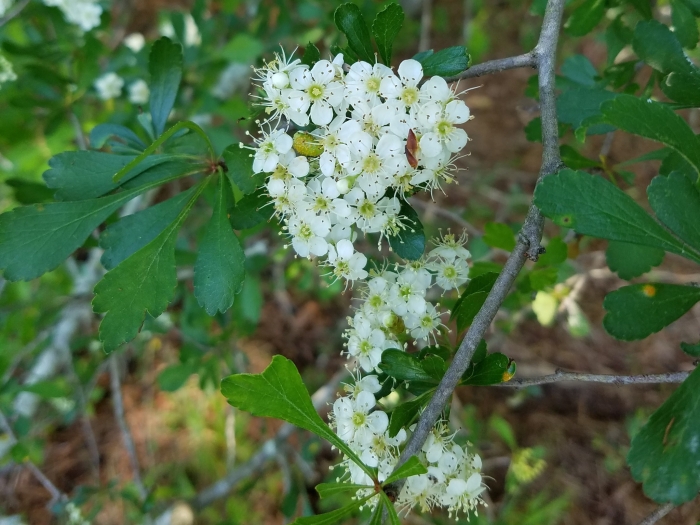Littlehip Hawthorn
(Crataegus spathulata)
Littlehip Hawthorn (Crataegus spathulata)
/
/

© Leila Dasher
CC BY 4.0
Image By:
© Leila Dasher
Recorded By:
Copyright:
CC BY 4.0
Copyright Notice:
Photo by: © Leila Dasher | License Type: CC BY 4.0 | License URL: http://creativecommons.org/licenses/by/4.0/ | Uploader: supertiger | Publisher: iNaturalist |

























Estimated Native Range
Summary
Crataegus spathulata, commonly known as Littlehip Hawthorn, is a deciduous shrub or small tree native to the southeastern United States, particularly found in open woodlands and along forest edges. It typically grows to a height of 15 to 20 feet (4.5 to 6 meters) with a similar spread. The Littlehip Hawthorn is characterized by its small, spatula-shaped (spathulate), bluish-green leaves that turn yellow to red in the fall, adding seasonal interest. Its white flowers bloom in late spring and are modestly showy, attracting pollinators. The flowers give way to small, orange to red pomes (fruit) that persist into winter and are favored by birds and wildlife.
This species is valued for its ornamental features, including its attractive foliage, spring flowers, and colorful fruit. It is used in native plant gardens, as a specimen plant, or for naturalizing in informal hedges and wildlife gardens. Littlehip Hawthorn prefers full sun to part shade and adapts well to a variety of soil types, though it thrives in well-drained soils. It is relatively low-maintenance once established and is drought-tolerant. Gardeners should be aware of its thorny branches, which can be a consideration for planting location. While generally disease-resistant, it can be susceptible to rust diseases and fire blight. There are no popular cultivars widely available, but the species itself is well-regarded for its adaptability and ecological benefits.CC BY-SA 4.0
This species is valued for its ornamental features, including its attractive foliage, spring flowers, and colorful fruit. It is used in native plant gardens, as a specimen plant, or for naturalizing in informal hedges and wildlife gardens. Littlehip Hawthorn prefers full sun to part shade and adapts well to a variety of soil types, though it thrives in well-drained soils. It is relatively low-maintenance once established and is drought-tolerant. Gardeners should be aware of its thorny branches, which can be a consideration for planting location. While generally disease-resistant, it can be susceptible to rust diseases and fire blight. There are no popular cultivars widely available, but the species itself is well-regarded for its adaptability and ecological benefits.CC BY-SA 4.0
Plant Description
- Plant Type: Shrub, Tree
- Height: 15-36 feet
- Width: 15-25 feet
- Growth Rate: Slow, Moderate
- Flower Color: White
- Flowering Season: Spring
- Leaf Retention: Deciduous
Growth Requirements
- Sun: Full Sun, Part Shade
- Water: Medium
- Drainage: Medium, Fast
Common Uses
Bee Garden, Bird Garden, Low Maintenance
Natural Habitat
Open woodlands and forest edges
Other Names
Common Names: Pasture Hawthorn
Scientific Names: , Crataegus spathulata, Cotoneaster spathulatus, Crataegus apiifolia var. flavanthera, Crataegus microcarpa, Crataegus spathulata var. flavanthera, Crataegus spathulata var. flavanthera, Mespilus azarolus, Mespilus spathulata, Phaenopyrum spathulatum,
GBIF Accepted Name: